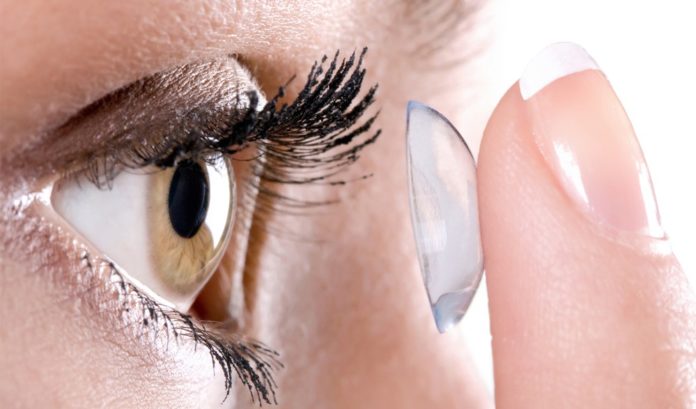Changes in the lipid layer of the eyes’ natural tear film may contribute to the common problem of contact lens discomfort, reports a study in the December issue of Optometry and Vision Science, official journal of the American Academy of Optometry. The journal is published by Lippincott Williams & Wilkins, a part of Wolters Kluwer Health.
Applying a liposomal eyelid spray appears to reduce drying of the tear film and help make wearing contact lenses more comfortable, according to the pilot study by Fiona Stapleton, PhD, FAAO, of University of New South Wales, Sydney, and colleagues.
Contact Lenses Alter Lipid Layer of Tear Film…
The researchers performed in-depth analyses of the tear film in two groups of soft contact lens wearers: ten with contact lens discomfort and ten without discomfort. The tear film is a three-layered “sandwich” of fluids that nourish and protects the eyes.
The study focused on the tear film’s outermost layer, which is composed of fat- and wax-like molecules called lipids. The lipid layer performs an important barrier function in preventing evaporation of tears and maintaining stability of the tear film.
The researchers found some differences in the tear film of patients with and without contact lens discomfort. In particular, patients with discomfort showed degradation of the lipid layer after a few hours of wearing contact lenses.
A measure of drying of the surface of the eye also differed between groups. Time for the first dry spot to appear on the eye surface after blinking was less than half as long in patients with contact lens discomfort: 4.5 seconds, compared to 9.9 seconds in patients without discomfort.
…With Possible Benefit of a Liposomal Eyelid Spray
Dr Stapleton and colleagues also evaluated the effects of a liposomal spray designed to protect the tear film. After the liposomal product was sprayed on the eyelids, the stability of the tear film increased significantly. There were also increased levels of a specific enzyme (phospholipase) affecting lipid metabolism.
For the patients with contact lens discomfort, drying times were significantly longer after using the liposomal eyelid spray. Contact lens comfort was increased for up to six hours after using the liposomal spray, compared to an inactive solution.
Contact lens discomfort is a very common problem. Previous studies have suggested that the tear film plays an important role in contact lens discomfort. The liposomal eyelid spray used in the study has shown benefits in patients who have problems with dry eyes.
The new study, using detailed, laboratory-based methods, adds new evidence that the lipid layer is degraded in patients with contact lens discomfort. It also suggests that the liposomal eyelid spray can improve tear film stability and certain components of the lipid layer — potentially improving problems with contact lens discomfort.
“Discomfort is the primary reason why otherwise successful contact lens wearers don’t wear contact lenses,” comments Anthony Adams, OD, PhD, Editor-in-Chief of Optometry and Vision Science. “Our authors identify the changes in the lipid layer of the tear film in people who have discomfort wearing contact lenses. They also provide preliminary evidence that a lipid supplement spray can help keep the eyes from drying and provide improvement in contact lens comfort.”
Story Source:
The above story is based on materials provided by Wolters Kluwer Health: Lippincott Williams and Wilkins. Note: Materials may be edited for content and length.
Journal Reference:
- Athira Rohit, Mark D. P. Willcox, Simon H. J. Brown, Todd W. Mitchell, Fiona Stapleton. Clinical and Biochemical Tear Lipid Parameters in Contact Lens Wearers. Optometry and Vision Science, 2014; 91 (12): 1384 DOI: 10.1097/OPX.0000000000000420
